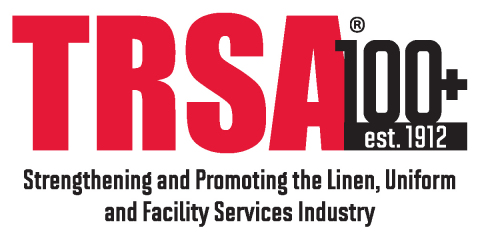TRSA Cautions Leaders Not to Shut Down Industries Vital to the Fight Against COVID-19 and the Nation’s Food Supply
TRSA Cautions Leaders Not to Shut Down Industries Vital to the Fight Against COVID-19 and the Nation’s Food Supply
By Any Standard Our Industry Provides a ‘Vital Service’
ALEXANDRIA, Va.--(BUSINESS WIRE)--Federal, state and local officials are being cautioned not to shut down businesses that are taking part in the fight against COVID-19 and are critical to the safety of our nation’s food supply. The TRSA represents the linen, uniform and facility services industry which supplies clean uniforms and other essential items to health care workers, food processing facilities and first responders throughout the United States.
“The importance of the commercial laundry and facilities services industry is recognized by the “essential services” designation by several state governments allowing our laundry and facility service operations to stay open during quarantine/isolation guidelines,” said Joseph Ricci, President & CEO of TRSA, The Association for Linen, Uniform and Facility Services.
“We are concerned because of the confusion created by various state level shutdown orders that do not specifically identify our members as providing ‘essential services,’” says Ricci. “We are gratified that several states, including California, Florida, Kentucky, Nevada and Pennsylvania have specifically provided guidance confirming commercial laundries as ‘essential services’ with New York and New Jersey authorizing laundry operations as ‘necessary to ensure the safety, sanitation and operations of ‘essential services.’ However, as more states and municipalities order closures and shelter-in-place directives, there is confusion regarding continued operations. We are working state-by-state for direct guidance and advising members to continue to operate as Facility Support Services that include janitorial, maintenance, trash disposal, guard and security, mail routing, reception, laundry, and related services to support operations while we gain clarification and guidance to include the industry’s Linen and Uniform Supply.
“During this time, we are servicing other industries designated as “essential” including healthcare operations, infrastructure maintenance and repair, grocery stores, food processing, manufacturing, and long-term care, water and energy facilities, first-responders, laboratories, pharmaceutical manufacturers, other fundamental supply chain businesses and government agencies, all of whom are on the Life Sustaining Business list,” said Ricci.
“An interruption in hygienically clean and safe garments would put the workers in danger and in the instance of the food manufacturing sector, slow food processing operations creating a food shortage at grocery stores. In addition, the many customers we service in the medical sector also rely on the garments and products we provide as a key part of their business operations,” Ricci added.
“Health and social care services cannot safely function without bed linen, scrubs and patient wear washed to very high specifications,” says Ricci. “Shutdown of these services in Europe led to delays in patient care.”
Shortages of disposable surgical gowns and drapes are a possibility given the likelihood of interrupted international supply chains and the preponderance of smaller medical facilities with limited storage capacity of these items. In contrast, reusable surgical textiles deployed and maintained according to their controlled life cycles and properly sterilized, are less dependent on supply replenishment.
Other linen and uniform service users highly susceptible to contamination include food manufacturers, laboratories, pharmaceutical manufacturers and first responders. These businesses and public safety agencies require hygiene-related products, including personal protective equipment (PPE) for their employees and facility services products such as cleaning chemicals to operate in a safe and sanitary manner. Personal protective equipment (flame resistant, high visibility, food service coats, etc.) have characteristics that must be processed in a special way to maintain its integrity. The workers cannot launder these garments themselves and properly maintain the safety aspects of the material.
“Because our industry serves virtually every type of private- and public-sector organization across the economy, most Americans benefit at least once per week from the hygiene and safety of products we provide. This highlights the imperative that laundries be considered essential to a sound public health policy,” Ricci said.
“Anyone hearing of local and state guidelines adverse to the essential role of professional laundries is urged to contact TRSA immediately so we can bring the industry’s strength to their attention to solidify our industry’s role in a sound public health program,” Ricci added.
About TRSA
By advocating for fair regulatory and legislative policy and promoting the environmental benefits of reusable textiles, TRSA (www.trsa.org) represents the $40 billion+ linen, uniform and facility services industry, which employs nearly 200,000 people at more than 2,500 facilities in North America. TRSA verifies and quantifies our industry’s commitment to sustainability and cleanliness through our Clean Green and Hygienically Clean Certification programs. Most Americans benefit at least once per week from the hygiene and safety of laundered, reusable linens, uniforms, towels, mats and other products provided to the industry’s customers that enhance their image and provide clean, safe environments for their employees and customers. TRSA increases the industry’s productivity, sustainability, safety and professionalism through education, research, benchmarking and information-sharing.
Contacts
Joseph Ricci, President and CEO, 703.519.0029, x100, jricci@trsa.org
